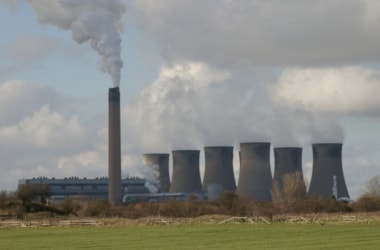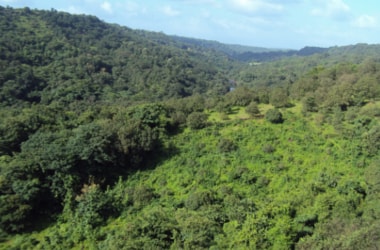▼ UK goes without coal for whole day! [04-24-17]
 The UK went a full day without using coal to generate electricity for the first time since the Industrial Revolution, according to the National Grid. The UK went a full day without using coal to generate electricity for the first time since the Industrial Revolution, according to the National Grid.
The energy provider said the lack of coal usage was a "watershed" moment.
Britain's longest continuous energy period without coal until now was 19 hours - first achieved last May, and again in April 2017.
The government plans to phase out Britain's last plants by 2025 in order to cut carbon emissions.
The 21st April blackout is thought to be the first time the nation has not used coal to generate electricity since the world's first centralised public coal-fired generator opened in 1882, at Holborn Viaduct in London.
To have the first working day without coal since the start of the industrial revolution is a watershed moment in how the UK energy system is changing.
The UK benefits from highly diverse and flexible sources of electricity.
The energy mix continues to change and National Grid adapts system operation to embrace these change.
According to the National Grid, around half of British energy on Friday came from natural gas, with about a quarter coming from nuclear plants.
Wind, biomass, and imported energy were also used.
The last deep coal mine in the UK, Kellingley Colliery in North Yorkshire, closed in December 2015, bringing to an end centuries of deep coal mining in Britain.
National Grid: Know More
- The National Grid is the high-voltage electric power transmission network in Great Britain.
- It is connecting power stations and major substations.
- It works for ensuring that electricity generated anywhere in England, Scotland and Wales can be used to satisfy demand elsewhere.
- The UK grid is connected as a wide area synchronous grid nominally running at 50 hertz.
- There are also undersea interconnections to:
1. Northern France (HVDC Cross-Channel),
2. Northern Ireland (HVDC Moyle),
3. The Isle of Man (Isle of Man to England Interconnector),
4. The Netherlands (BritNed) and
5. The Republic of Ireland (EirGrid).
|
▼ Climate change induced river piracy in Canada! [04-20-17]
 The retreat of Canada's largest glaciers has changed the flow of the northern river overnight in a case of what is being called climate change river piracy. The retreat of Canada's largest glaciers has changed the flow of the northern river overnight in a case of what is being called climate change river piracy.
Discovery of the Slims River diversion from the Bering Sea into another watershed that empties into the Pacific Ocean has been documented.
Slims riverbed dried up in a short span of 4 days. The habitat underwent a transformation and the chemistry and biology of water changed in a dramatic way.
Canadian geomorphologists in Canada's northern Yukon Territory came to study river currents, only to find the river missing.
The mysterious disappearance was traced to Slim River's headwaters where glacial barriers that routed the flow northward into the Bering Sea had been breached in spring.
This radically altered the drainage from the Kaskawulsh Glacier spring melt, as per the study sent the river in the opposite direction into the Pacific Ocean, 1,300 km from where the river's mouth used to be.
The researchers used computer models to display a fast glacier melt and the subsequent river diversion on account of global climate change and not natural temperature fluctuations over the centuries.
These changes can have profound downstream impacts on ecosystems and communities relying on the discharge.
Kluane Lake fed by the Slims River dropped a full meter below the lowest recorded level for the year. Researchers also indicated the discovery highlights that while people view climate change as a gradual process, the effects may not be so.
|
▼ Meet Kani Maranjandu, Kerala's tree dwelling crab [04-7-17]
 Scientists have discovered a new species of long legged, tree-dwelling crabs Kani maranjandu in Western Ghats of Kerala. Scientists have discovered a new species of long legged, tree-dwelling crabs Kani maranjandu in Western Ghats of Kerala.
The new species named Kani maranjandu after the Kani tribe in Kerala, are substantially different from other congeners.
The characteristic traits of the crab include the structure of its hard upper shell.
Also different are the structure of its male abdominal structure and reproductive parts and diagnostic elongated walking legs, which no other genus displays.
This is the first report of its kind to offer a record of an arboreal crab - a species that lives in trees.
The survey of the freshwater crab fauna started in 2014 in the Westerns Ghats in Kerala.
As water holding hollows in large trees are essential for the survival of this unique species, the discovery also stress the need for conservation of large trees in the degraded forest ecosystems of the Western Ghats.
Western Ghats: Know More
- Elevation: 2,695 m
- Area: 160,000 km2
- Highest point: Anamudi
- Passes: Tamhini Ghat, Naneghat, Palakkad Gap, Kasara ghat
- Types of rock: Basalt, Limestone
|
▼ IIITM-K launches app BIOTA [04-6-17]
 The Indian Institute of Information Technology and Management Kerala has launched a mobile app to track and gather data on distribution of flora and fauna. The Indian Institute of Information Technology and Management Kerala has launched a mobile app to track and gather data on distribution of flora and fauna.
This is aimed to help research scholars and scientists in the field of conservation and research.
Biodiversity app BIOTA was developed by researchers at CV Raman Laboratory of Ecological Informatics at IIITM-K.
This has been set up for higher education and research in the area of information technology.
A version of this app was also launched by the National Biodiversity Conference.
|
▼ India, UK set up clean energy fund [04-5-17]
 India and the UK have on April 4, 2017 decided to set up a 500 million pound fund. Both governments will be investing 240 million pounds to finance clean energy projects. India and the UK have on April 4, 2017 decided to set up a 500 million pound fund. Both governments will be investing 240 million pounds to finance clean energy projects.
The fund will be set up as a sub fund of the INR 40,000 crore NIIF which was formed in 2015 to finance greenfield and brownfield projects.
India and the UK will be anchors of this clean fund. It is called “Green Growth Equity Fund”.
India and the UK will invest 120 million pounds each and the remaining 260 million pounds comes from private investors.
The two governments have reinforced their commitment to invest 120m pounds each in the joint fund, at a joint statement issued following the 9th UK-India Economic and Financial Dialogue.
The fund will focus initial investments on India's rapidly transforming energy and renewable markets.
This fund will also identify future investments. In December 2015, the NIIF fund was set up for funding commercially viable brownfield, greenfield and stalled projects.
As government investment in the fund will be limited to 49 percent, private domestic and foreign investors can hold the 51% that remains.
These investors can invest in an umbrella fund or smaller sector/project specific funds within it.
The government had announced it will set up two sub funds under the NIIF namely a clean energy fund focused on renewable energy and another focusing on highway projects.
|
▼ India's forest cover increases [04-4-17]
 India's forest cover has increased in comparison to the world average. The world over, average per capital forest cover has fallen from 0.8 ha to 0.6 ha per person. India's forest cover has increased in comparison to the world average. The world over, average per capital forest cover has fallen from 0.8 ha to 0.6 ha per person.
In India, a net increase of 1.82% in forest cover has been registered in the past 30 years.
This was announced at the inauguration of the 19th Commonwealth Forestry Conference in FRI, Dehradun.
The country had 24% forest cover with 7 billion tonnes of carbon sink–a natural reservoir that absorbs carbon and helps counter the effects of global warming.
India has to add 2.5 to 3 billion tonnes to the carbon sink by 2030.
This will be done by planting trees outside the forests near highways or in agro-forestry sector.
The target of increasing the sink would be met by growing 100 crore trees over a period of ten years.
Governments, the private sector, local authorities, NGOs and indigenous people work together for forestry and environmental conservation.
Recent research has shown that the cash and non-cash incomes of the rural poor depend to a very high degree on what the forestry and environmental professionals now call the 'ecosystem services' provided by varied forests.
Protecting forests, therefore, not only makes sense for reducing disaster risk and greenhouse emissions; it also makes pro-poor sense.
|
▼ Grassoline, world's first biofuel derived from grass! [04-4-17]
 In the quest for sustainable energy sources, scientists have developed "grassoline" -a biofuel derived from grass that may one day power aircraft. In the quest for sustainable energy sources, scientists have developed "grassoline" -a biofuel derived from grass that may one day power aircraft.
For the experiment, researchers investigated methods to disintegrate and treat grass until it could be used as a fuel.
Until now, grass has mainly served as feed for animals. But apart from that, grass can also be used as biofuel. Due to its vast abundance, grass is the perfect source of energy.
To improve its biodegradability, the grass was pretreated at first.
Then bacteria were added to convert sugars in the grass into lactic acid and its derivatives.
This lactic acid can serve as an intermediate chemical to produce other compounds such as biodegradable plastics (PLA) or fuels.
The lactic acid was then converted into caproic acid, which was further converted into decane.
Decane could be used in aviation fuel.
Scientists have developed "fuzzy fibres" that act like velcro and could stand up to the heat and pressure of rocket engines.
The fibres made of silicon carbide strengthen composites used in advanced rocket engines that have to withstand temperatures up to 1,600 degrees celsius.
Ceramic composites used in present rockets can crack or become brittle when exposed to oxygen.
|
▼ BS-IV grade fuel launched in 12 towns [04-3-17]
Union Petroleum and Natural Gas Minister Dharmendra Pradhan on April 1, 2017 launched a supply of BS-IV grade fuel in 12 towns through video-conferencing.
This commences a new era of clean transportation fuels that would benefit 1.25 billion citizens of India by substantially reducing pollution levels.
Even though India is not a polluting country, it has shown commitment for reducing vehicular emission.
Oil companies were asked to expedite their efforts to introduce BS-VI standards by April1, 2020
The oil upgradation programme commenced in 1991.
Oil companies have achieved emission standards by continuously introducing advance technology and making huge capital expenditure.
The oil industry has spent over INR . 28,000 crore after 2010 for supplying BS-IV grade fuel. It was in addition to INR. 35,000 crore already spent before 2010.
Mr. Tripathi said oil companies would further spend INR 28,000 crore to supply BS-VI specification oil by 2020. As of now total investment made to upgrade oil comes to around INR 90,000 crore.
The Supreme Court has banned the sale of BS-III vehicles from April 1.
BS-VI: Know More - According to Petroleum and Natural Gas Ministry, India has reduced its diesel content from 10,000 ppm in the most of the country in 1996 to a maximum of 50 ppm in 2017.
The proposed BS-VI regulation will reduce diesel sulphur content to a maximum 10 ppm. - This will be enabling the introduction of advanced emission control technologies, including diesel particulate filters and selective catalyst reduction systems.
- This will be needed to meet BS-VI emission standards.
- As the technology for BS-V is not very different, it was decided to go straight to BS-VI grade fuels from BS-IV.
|
▼ Bhoorsingh, the Barasingha is Kanha's official mascot [04-3-17]
Kanha has become the first tiger reserve in India to officially introduce a mascot - Bhoorsingh the Barasingha - to present the hard ground swamp deer as the spirit of the reserve and spread awareness to save it from possible extinction.
Barasingha, or swamp deer, is the state animal of Madhya Pradesh.
The Kanha tiger reserve, spread over Mandla and Balaghat districts, is the only place in the world where the species exists.
The idea emerged from the work of Nagpur’s award-winning cartoonist Rohan Chakravarty, who makes cartoons and illustrations on wildlife.
The cartoonist choose the Barasingha, an endemic variety of deer, as the park’s mascot. ‘Bhoor’ means tawny/golden and ‘Singh’ means antlers.
Bhoorsingh will soon feature in more artwork, posters and merchandise for the park management at Kanha.
As per the forest department, the mascot will not only play an important role in attracting the younger generation towards conservation but will also be used to spread awareness in form of stories and comic strips.
The good conservation practises coupled with grassland management by the forest department saw the population, which was on the brink of extinction in the 70's, to increase to more than 800 now.
Kanha: Know More - State: Madhya Pradesh
- Area: 940 km²
- Established: 1955
|
▼ El Salvador bans metal mining [04-3-17]
Lawmakers in El Salvador voted overwhelmingly on 29th March 2017 to prohibit all mining for gold and other metals.
This makes the country the first in the world to impose a nationwide ban on metal mining, environmental activists said.
Declaring that El Salvador’s fragile environment could not sustain metal mining operations, legislators across the political spectrum approved the ban, which had broad support, particularly from the influential Roman Catholic Church.
Supporters said the law was needed to protect the country’s dwindling supply of clean water.
The vote in the Legislative Assembly turned a decade-old moratorium on mining into law, halting efforts by international companies to tap the gold belt running across the northern provinces of El Salvador.
The law does not apply to quarrying or the mining of coal, salt and other nonmetallic substances.
Other countries are unlikely to follow El Salvador’s national ban, mining watchdog groups say.
But the law sets a powerful example to communities that oppose large mining projects and bolsters the case against mining in environmentally delicate areas.
Around the world, scattered bans on the use of cyanide to extract gold from low-grade ore, commonly used in open-pit mining, are in place, including in Montana.
Costa Rica has a national ban on open-pit gold mining.
Germany, the Czech Republic, Hungary, Turkey and several Argentine provinces have cyanide bans.
In the Philippines, the government ordered more than half the mines to shut down or be suspended.
|
| Chronology of events |
|
The 19th Commonwealth Forestry Conference, slated to be held from April 3 to 7 at the Forest Research Institute (FRI), Dehradun, will help in developing effective strategies to counter climate change and other challenges in forests.
|
|
National Mission for Clean Ganga has approved 26 projects at an estimated cost of Rs 2154.28 Crore. This amount will be spent in the states of UP, Uttarakhand, Jharkhand and Delhi for creation of new sewage treatment capacity of 188 Million Litres per Day (MLD) (approx.), rehabilitation of 596 MLD of existing STP capacity, upgradation of 30 MLD of existing STP capacity, Interception and Diversion works and sewerage network of 145.05 km.
|
|
The Keibul Lamjao National Park is the only floating park in the world, located in the Bishnupur district of Manipur. It is an integral part of Loktak Lake.
|
|
CEOs of 5 IT firms held a meeting underwater to raise awareness about global warming and marine pollution. The meeting took place at a famous beach resort in Kovalam, Kerala. Armed with their scuba diving gear, the CEOs took plunge into the water 50 metres off the shore.
|
|
The Central government is planning a Ganga Patrol team comprising IPS officers, Army personnel, paramilitary forces and also state police officers to raise Ganga Volunteer Force.
|
|
The National Disaster Management Authority (NDMA) conducted a first-of-its-kind State-level mock exercise on forest fire in Uttarakhand.
|
|
The National Grid has announced Britain’s first full day without coal power “since the Industrial Revolution”. The Government has pledged to phase out coal – the most polluting fossil fuel – from the system by 2025 as part of efforts to cut carbon emissions in the UK.
|